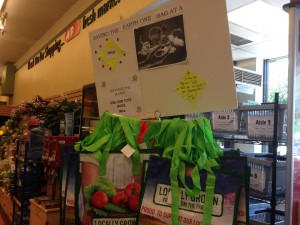Westchester County”™s 1 million residents need a tremendous amount of groceries each week to sustain their households. They also need a complementary amount of plastic bags to pack them in. However, some area lawmakers say the plastic bags have outlived their usefulness because of their adverse impact on the environment.
The city of Rye and the villages of Larchmont, Mamaroneck and Hastings-on-Hudson have all separately banned the so-called one-time-use plastic bags from retail stores in their communities.
The village of Ossining board of trustees on June 24 approved a resolution of support for a proposed county law that would limit the use of plastic bags and polystyrene or Styrofoam containers by retail stores throughout the county. The bill was introduced in November by Legislator Catherine Parker, a Rye Democrat, and co-sponsored by Legislator Catherine Borgia, a Democrat from Ossining.
The resolution said a ban would lessen the financial burden on local governments, who pay to clean up the litter created by the improper disposal of the bags. Ossining Mayor Victoria Gearity, also an executive committee member of the Northern Westchester Energy Action Consortium, said the bill would benefit the region”™s waterways and streets. The village board is expected to vote on the proposed resolution July 1.
“One of the considerations is the cost and labor associated with so many single-use plastic bags ending up in our stormwater system,” Gearity said.
In January, Hastings-on-Hudson became the first Westchester municipality to enforce a ban on both one-time use plastic bags and Styrofoam containers, from its roughly 50 businesses, as estimated by Hastings Mayor Peter Swiderski. The law sets a $250 fine for first-time offenders and a $500 fine for each subsequent offense.
The ban “eliminates the risk that somebody will go to another supermarket because if everyone is on board then there”™s no competitive bad behavior,” Swiderski said. “If these bans become matter-of-fact at a higher level, eventually the corporate resistance and lawsuits will fade away and change will be allowed to stick.”
In October, five months after the ban was approved, the village was sued by The Food Industry Alliance of New York State Inc., a grocery trade association, which challenged the notion that plastic bags provided at the village”™s stores were in fact “single-use.” The lawsuit seeking to overturn the ban is pending.
Michael Rosen, the alliance”™s executive director, said the organization takes an alternative approach to the issue. Paper bags, he said, are not any more biodegradable and do not hold as much product as their plastic counterparts.
“Paper bags cost two to three times more than what plastic bags do,” he said. “On top of that, grocers operate at a very thin profit margin. When a large expense is imposed on them, the expense is passed along to the public.”
The food industry group encourages grocers to house recycling stations for bags or sell reusable bags for a nominal fee. Rosen said stores often offer customers an incentive for using a reusable bag, such as a small discount.
The solution, said Rosen, is to not only promote reusable bags but also charge a 5-cent or 10-cent fee to use either a plastic or paper bag at the register.
Ossining, like several other Westchester communities, had considered its own individual ban. Now the village, which has a Super Stop & Shop and C-Town Supermarket within its borders, is putting its energy toward the countywide effort.
Borgia, the co-sponsor of the bill, said she hoped discussion of the bill by the county Board of Legislators can conclude by the fall and proceed to a vote. The village of Ossining, her office said, has been a supporter of the bill “from the get-go,” and added that other municipalities have also expressed their desire to support it.
The resolution being considered by Ossining trustees “is a political strategy for local governments to pass legislation first to help regional government pass legislation,” Borgia said.
In a statement issued when the county bill was proposed, the ban”™s sponsors said Americans use 100 billion plastic bags annually and only 15 percent of those are recycled. Plastic and Styrofoam can become entangled in trees and clog waterways and sewage systems, partially because of their lack of biodegradability.
Grocers are encouraged to house recycling stations for bags or sell reusable bags for a nominal fee. Rosen said stores often offer customers an incentive for using a reusable bag, such as a small discount.
In this region, organizations such as the Citizens Campaign for the Environment have pushed for communities to adopt measures that would prohibit nonbiodegradable packing items in stores. Jordan Christensen, the organization”™s Hudson Valley program coordinator, said the new municipal restrictions not only positively change customer behavior but also business behavior. Stores often have to implement signs regarding the ban, hold education sessions for employees or host reusable bag giveaways during the initial phase-in, which can last several months, she said.
Christensen cited not only the county”™s four municipalities that have banned plastic bags, but also states and countries like Hawaii, California and Bangladesh, all of which have successfully enacted similar laws on a larger scale.
The county ban “would put us as New Yorkers on the scale of the big movement,” Christensen said. “If Italy and California can do it, so can Westchester.”



















